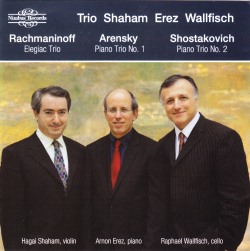
Support us financially by purchasing
this through MusicWeb
for £12 postage paid world-wide.
 |
Sergei RACHMANINOV (1873-1943)
Trio élégiaque in G minor (1892) [13.48]
Anton ARENSKY (1861-1906)
Piano Trio. 1 in D minor, Op. 32 (1894) [30.23]
Dmitri SHOSTAKOVICH (1906-1975)
Piano Trio No. 2 in E minor Op. 67 (1944) [26.20]
Modest MUSSORGSKY (1839-1881)
Une larme, arr. piano trio, A.K. Krein (1880) [4.29]
Arnon Erez (piano), Hagai Shaham (violin), Raphael Wallfisch (cello)
rec. 22-24 April 2014, Wyastone Leys, Monmouth, UK
NIMBUS NI 5917 [75.00]
Rachmaninov was only nineteen years old when he wrote the single movement Trio élégiaque. Although premièred the same year in Moscow the trio was not published in the composer’s lifetime. The Trio élégiaque No. 2 (1893, revised 1906) is by far the best known of Rachmaninov’s two piano trios. Playing with passionate expression the trio of Erez, Shaham and Wallfisch makes a convincing case for this underrated 1892 score.
Arensky taught Rachmaninov at the Moscow Conservatory but as a composer he is far less known. He wrote a considerable body of work with this four movement Piano Trio Op. 32 considered his masterpiece. It displays the composer’s innate aptitude for lyricism. The three players here are very much at home with Arensky and with the spirit that lies at the core of this impressive music.
Shostakovich’s Piano Trio No.2 is now recognised as one of the masterpieces of the chamber music repertoire. Written in 1944 it was created amongst the turmoil of war whilst the composer was staying at the Soviet composers resort in Ivanovo. Shostakovich may not have been on the front-line although he had undertaken fire fighting duties at the Leningrad Conservatory; nevertheless, he was haunted by the images of war and knocked for six by the deaths of close friends. The world première took place in November 1944 in Leningrad; one of the first concerts after the city’s horrific siege. The trio here give a robust reading of rock-solid conviction that assists in communicating the work’s elegiac temperament.
The final work here is Mussorgsky’s Une larme, a late piece for solo piano. We hear this in an arrangement by A.K. Krein. It serves as a pleasant filler — nothing more.
The playing of this selection of Russian/Soviet repertoire is committed but there are two major drawbacks. Crucially I found the intonation of violinist Hagai Shaham problematic and for my taste the piano was placed too forward in the balance at the expense of the strings. There are much better alternatives, namely the compelling accounts from the Beaux Arts Trio/Philips in the Rachmaninov and Arensky. In the Shostakovich it is hard to match Elisabeth Leonskaja with the Borodin Quartet for their riveting playing on Teldec.
Michael Cookson
|














